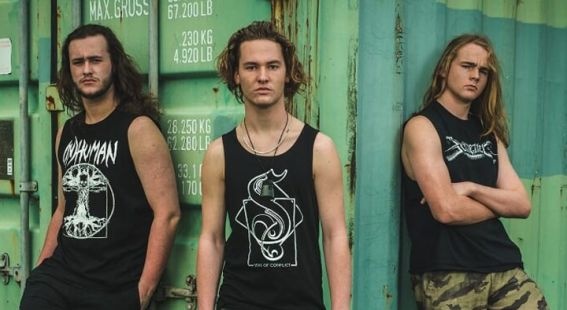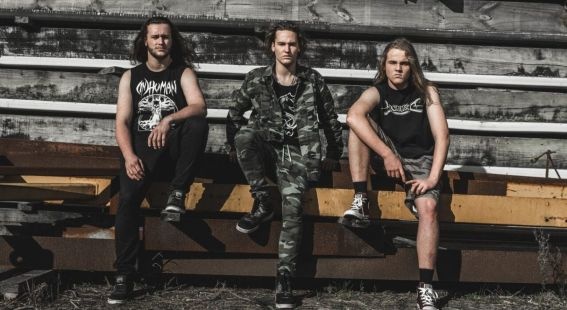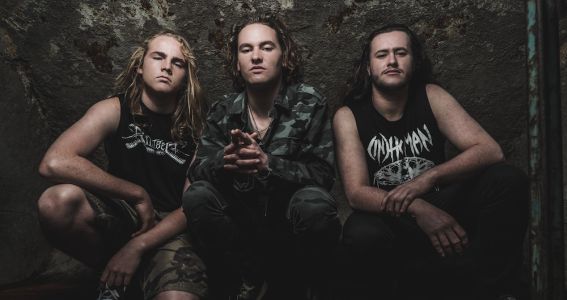Scroll down for the English version
Ciao ragazzi, benvenuti su SpazioRock.it! Come state?
Alla grande, grazie!
Tra pochi giorni raggiungerete la terra italica! Suonerete a Milano e a Padova. Se non mi sbaglio, questa è la prima volta per voi in Italia. Siete pronti? Lascia che vi dia un piccolo avvertimento: il pubblico italiano è particolarmente attivo!
Sì, questa sarà la nostra primissima volta in Italia, non vediamo davvero l'ora. Suoneremo al Circolo Magnolia di Milano il 15 luglio e al Parco della Musica di Padova il 16. Per quanto riguarda il pubblico italiano, beh, abbiamo avuto un pubblico davvero entusiasta fino ad ora in giro per l'Europa, quindi se sapranno fare di meglio, ben venga! Più scatenato è il pubblico, più bello è lo show.
State tenendo concerti in grandi città europee. Come sta andando il tour?
Il tour è stato incredibile fino ad ora. Abbiamo avuto un pubblico grandissimo ai festival quali hellfest, Copenhell e Ressurrection Festival e, in più, abbiamo avuto l'opportunità di fare degli show più intimi, come quelli che faremo in Italia. E' fantastico vedere il pubblico così da vicino e di solito usciamo fuori e li incontriamo, alla fine. E' davvero bello parlare con i nostri fan e abbiamo incontrato persone magnifiche.
Avete pubblicato il vostro debut album "Tū" lo scorso anno e avete ricevuto dei commenti assolutamente positivi, sia dai vostri fan che dalla critica. Siete soddisfatti del risultato ottenuto?
Sì, siamo davvero contenti di questo nostro primo album. Rappresenta la band ad un certo punto della carriera, quando eravamo pronti a mostrare la nostra musica al mondo e siamo davvero entusiasti che il mondo abbia risposto così positivamente.
Ok, adesso arriva la domanda che tutti stavamo aspettando: come vi è venuta in mente questa idea di fare del metal in lingua maori? Raccontateci di più la vostra storia...
Henry e Lewis hanno frequentato la kura kaupapa Māori, una scuola in lingua esclusivamente Māori quando erano dei bambini, quindi hanno iniziato a parlare questa lingua molto fluentemente fin da piccoli. Quando abbiamo dato vita alla band, andavamo ad una scuola in lingua inglese e abbiamo partecipato ad una gara scolastica tra band, la Smokefreerockquest. C'era poi un'altra gara simile a questa, la Smokefree Pacifica Beats, che richiedeva di scrivere le canzoni in lingua nativa maori o in un linguaggio nativo dell'area del Pacifico. Alcuni nostri amici hanno vinto quella competizione e così ne siamo venuti a conoscenza anche noi. Abbiamo deciso di partecipare e l'abbiamo vinta due anni dopo, lo stesso anno abbuamo vinto anche la Smokefreerockquest. La prima canzone che abbiamo scritto in Te Reo Māori è stata "Rū Ana Te Whenua". Questa canzone ha colpito un sacco di persone e abbiamo deciso di continuare a scrivere altre canzoni in lingua Te Reo Māori. Ci sono un sacco di similarità tra il metal e l'haka, sia nei ritmi che nei temi. Funzionano bene insieme.
Quali sono le vostre fonti di ispirazione quando scrivete una canzone?
Solitamente, buttiamo giù prima la musica, e per quello traiamo spunti da ovunque, non solo il metal, ma anche il rap, l'hip-hop, il raggae, drum&bass; cerchiamo di essere aperti a tutto. Lewis scrive molti dei nostri testi, ha un libro dove scrive e noi facciamo riferimento a quello. Scriviamo di cose che sono importanti e che hanno un significato per noi, può essere qualsiasi cosa che riguarda la nostra sfera personale e che ha a che fare con la rabbia, la frustrazione e l'ansia, alla critica sociale circa le cose nel mondo che ci toccano, o ancora storie riguardo ai nostri antenati e gli eventi passati della nostra storia che riteniamo importanti o toccanti.
I vostri testi raccontano storie piene di messaggi che hanno un significato profondo. Avete mai temuto il fatto che la gente non potesse capire totalmente quello che volevate dire per via della lingua?
No, la cosa non ci ha mai preoccupato per nulla, perchè fin dall'inizio la gente commentava su YouTube e Facebook che anche se non capiva i testi delle nostre canzoni maori, loro comunque venivano attratti e ispirati da loro e capivano il lato emozionale. Siamo davvero sorpresi di quante persone cantino con noi nella lingua maori in questi giorni di tour, e alcuni hanno avuto anche la premura di leggere la traduzione. In alcuni dei posti in cui suoniamo, la gente non è detto che parli inglese, quindi in quel caso potremmo porci la stessa domanda per le nostre canzoni in inglese.

C'è qualche band o artista particolare con cui vi piacerebbe collaborare?
A livello internazionale, ci piacerebbe collaborare con i Lamb of God o i Gojira, entrambe band che ascoltiamo ed ammiriamo molto. In Nuova Zelanda,siamo sempre stati interessari a lavorare con un artista, Tiki Tāne. Lui è una legenda nella scena nazionale ed è stato un nostro accanito sostenitore per anni. Ha suonato anche in band metal tempo fa. Pensiamo porterebbe un tocco molto interessante alla nostra musica.
Come vi vedete tra cinque anni?
Ci piacerebbe suonare headliner a festival come il Wacken Open Air, Metaldays, Download, Hellfest... più grande è, meglio è.
E invece quali sono i progetti immediati? Che mi dite sul nuovo album?
Abbiamo poco tempo per lavorare su nuovi materiali quando siamo in tour, ma abbiamo pubblicato un nuovo singolo lo scorso 12 luglio, "Blinded", che abbiamo registrato e filmato nei primi mesi di quest'anno in Nuova Zelanda. Saremo in tour in Europa fino alla fine di agosto, poi torneremo negli Stati Uniti fino alla fine di ottobre, ma dopo questo avremo un po' di tempo da spendere in Nuova Zelanda dove potremmo prenderci una pausa e scrivere qualcosa. Abbiamo intenzione di pubblicare il nostro secondo album nel 2020, ma questo dipenderà dai nostri impegni a livello di tour. Vogliamo che il nostro nuovo album sia micidiale, quindi non devono esserci compromessi per farlo bene.
Questa è la seconda volta che siete in tour in Europa. Lo scorso anno avete partecipato a grandi festival quali Metaldays e Wacken Open Air. Qualche ricordo di quei show?
Metaldays è stato il primo grande festival in cui abbiamo suonato in Europa e il primo festival ad averci invitato, quindi loro avranno sempre un posto speciale nel nostro cuore. Loro hanno decisamente dato il calcio d'inizio alla nostra esperienza di tour in Europa. Non vediamo l'ora di tornare ai Metaldays quest'anno, siamo davvero entusiasti di suonare nel main stage. Suonare al Wacken prima che avessimo passato l'adolescenza era un traguardo che ci eravamo prefissati come band. E' stato davvero soddisfacente raggiungere quell'obiettivo lo scorso anno, e abbiamo anche avuto un pubblico pazzesco in quell'occasione. Stavamo tremando quando abbiamo finito la performance e abbiamo fatto un meet and greet improvvisato di fronte al palco. C'era buio ed era un completo caos, ma dovevamo e volevamo andare già e salutare tutti.
E adesso lasciate un messaggio ai vostri fan italiani e ai nostri lettori... ovviamente in lingua maori!
He mihi nui mo to koutou tautoko rawe! Nau mai, haere mai ki a Milan, Padova ranei – me patu upoko matou!
(Grazie per il vostro fantastico supporto. Venite a trovarci a Milano e Padova, facciamo un po' di head banging!)
English Version
Hi guys and welcome to SpazioRock.it! How are you doing?
Great, thanks!
In a few days you'll reach the Italian land! You'll play Milan and Padova. If I'm not wrong, it is your first time in Italy, are you excited? Let me warn you: the Italian crowd is truly passionate!
Yes, this will be our first time in Italy, and we’re really looking forward to it. We are playing at Circolo Magnolia in Milan on 15 July; and Parco Della Musica in Padova in 16 July. As for the Italian crowd, well we’ve had some pretty crazy crowds so far in Europe, so if they can be crazier, we say bring it on! The more wild the crowd, the better the show.
You are playing on great stages in big cities. How was the tour so far?
The tour has been amazing so far. We have had some huge crowds at festivals like Hellfest, Copenhell and Ressurrection Festival; and also had the chance to do more personal shows, like the ones we are doing in Italy. It’s great to see the crowd up close and we usually come out and meet people afterwards. It’s good to actually talk to our fans and we have met some awesome people.
You released your debut album "Tū" exactly last year and you received a good response from critics and fans. Are you satisfied with what you've achieved?
Yes, we are really happy with "Tū" as a first album. It represents the band at a certain point in time, when we were ready to bring our music to the world, and we are stoked that the world has responded so positively.
Ok, here comes the long-awaited question: how did you come up with the idea of singing in Maori language? Tell me more about your band’s history and choices!
Henry and Lewis went to a kura kaupapa Māori (a total immersion Māori language school) when they were young children; so became fluent in speaking Māori from a young age. By the time we started the band, we were going to an English-speaking school and we entered a school band competition called Smokefreerockquest. There was a sister competition to Smokefreerockquest, called Smokefree Pacifica Beats, which required you to write songs in your native Māori or Pacific language. Our friends won that competition, and that’s how we found out about it, so we decided to enter it too, and ended up winning it two years later, the same year we won Smokefreerockquest. The first song we wrote in Te Reo Māori was Rū Ana Te Whenua – it really struck a chord with a lot of people, so we decided to keep writing more songs in Te Reo Māori. There are a lot of similarities with metal and haka – the Māori war chant; both in the rhythms and themes. They just work together.
What are your sources of inspiration when you start writing a new song?
We usually develop the music first, and we have influences from everywhere – not just metal, but also rap, hip-hop, reggae, drum & bass; we try to stay open to anything. Lewis writes a lot of our lyrics – he has a book he writes in and we often draw from that. We write about things that are important and meaningful to us – it could be anything from personal issues dealing with anger, frustration or anxiety; to social commentary about things in the world that affect us; to stories about our ancestors and past events in our history that we think are important or moving.

Your lyrics are telling stories that deliver emotional messages. Have you ever worried about the fact that people can’t fully get what you want to transmit because of the language?
No, we never worried about that at all, because right from the start, people would comment on YouTube and Facebook that even though they didn’t understand the lyrics in our Māori songs, they were still inspired by them and understood the emotion. We are actually amazed how many people sing along to the Māori lyrics these days, and a lot of people have taken the trouble to read the translations. In some of the places we play, people also don’t necessarily speak English, so I guess you could ask the same question about our English material.
Are ther any particular bands or artists you would like to collaborate with?
Internationally, we would love to work with Lamb of God or Gojira, which are both bands we have listened to a lot and admire. In New Zealand, we've always been keen to co-lab with with a kiwi artist called Tiki Tāne. He's a legend in the NZ music scene and has been a massive supporter of us for ages. He also used to play in metal bands back in the day. We think he'd bring an awesome new flavor to our music.
How do you see yourself in five years?
We would love to be playing headline slots at festival like Wacken Open Air, Metaldays, Download, Hellfest … the bigger the better.
What's next for Alien Weaponry? What about a new album?
We have limited time to work on new material while we are on the road, but we actually released a new single “Blinded” today (12 July), which we recorded and filmed earlier this year in New Zealand. We will be touring in Europe until the end of August; and then we will be back in the USA until the end of October, but after that we will have a few months in New Zealand where we can take a break and do some more song writing. We are aiming to release a second album in 2020, but it will depend on our touring schedule exactly when that happens. We want our next album to be an absolute killer, so there will be no compromises to get it right.
This is your second tour in Europe. Last year you took part into several large music festivals, including Metaldays, and Wacken Open Air. Any good memory about those shows?
Metaldays was the first big festival we played at in Europe; and the first festival to invite us, so they will always have a special place in our hearts. They definitely got the ball rolling for our European touring. We are really looking forward to returning to Metaldays this year, where we are excited to be playing the main stage. Playing at Wacken before we were out of our teens was a goal we set very early on in the band, so it was very satisfying to achieve that goal last year, and we also had an awesome crowd there. We were just buzzing when we finished and we did an impromptu meet and greet right down in front of the stage. It was dark and complete chaos, but we just had to go down and say Hello to everyone.
Please leave a message to your Italian fans and our readers… of course in Maori!
He mihi nui mo to koutou tautoko rawe! Nau mai, haere mai ki a Milan, Padova ranei – me patu upoko matou!
[Thanks for your awesome support! Come along to Milan or Padova – let’s do some head banging!]

